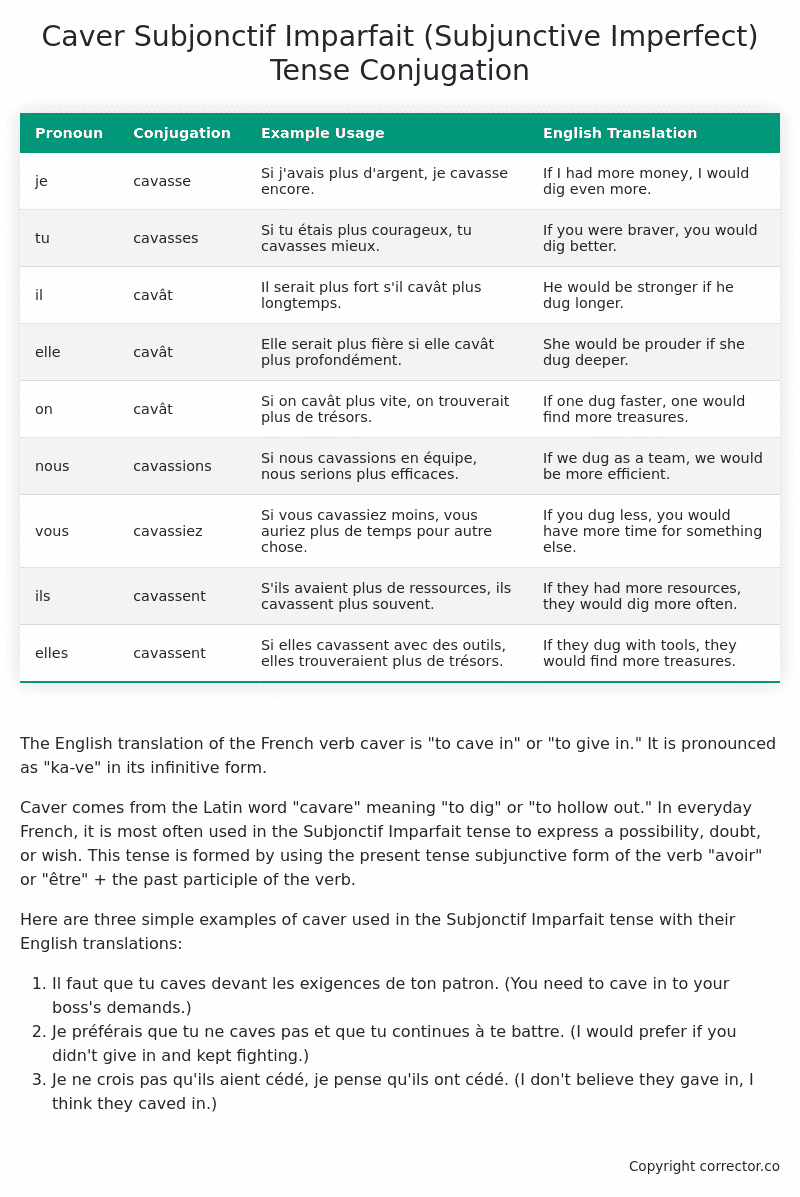Subjonctif Imparfait (Subjunctive Imperfect) Tense Conjugation of the French Verb caver
Introduction to the verb caver
The English translation of the French verb caver is “to cave in” or “to give in.” It is pronounced as “ka-ve” in its infinitive form.
Caver comes from the Latin word “cavare” meaning “to dig” or “to hollow out.” In everyday French, it is most often used in the Subjonctif Imparfait tense to express a possibility, doubt, or wish. This tense is formed by using the present tense subjunctive form of the verb “avoir” or “être” + the past participle of the verb.
Here are three simple examples of caver used in the Subjonctif Imparfait tense with their English translations:
- Il faut que tu caves devant les exigences de ton patron. (You need to cave in to your boss’s demands.)
- Je préférais que tu ne caves pas et que tu continues à te battre. (I would prefer if you didn’t give in and kept fighting.)
- Je ne crois pas qu’ils aient cédé, je pense qu’ils ont cédé. (I don’t believe they gave in, I think they caved in.)
Table of the Subjonctif Imparfait (Subjunctive Imperfect) Tense Conjugation of caver
| Pronoun | Conjugation | Example Usage | English Translation |
|---|---|---|---|
| je | cavasse | Si j’avais plus d’argent, je cavasse encore. | If I had more money, I would dig even more. |
| tu | cavasses | Si tu étais plus courageux, tu cavasses mieux. | If you were braver, you would dig better. |
| il | cavât | Il serait plus fort s’il cavât plus longtemps. | He would be stronger if he dug longer. |
| elle | cavât | Elle serait plus fière si elle cavât plus profondément. | She would be prouder if she dug deeper. |
| on | cavât | Si on cavât plus vite, on trouverait plus de trésors. | If one dug faster, one would find more treasures. |
| nous | cavassions | Si nous cavassions en équipe, nous serions plus efficaces. | If we dug as a team, we would be more efficient. |
| vous | cavassiez | Si vous cavassiez moins, vous auriez plus de temps pour autre chose. | If you dug less, you would have more time for something else. |
| ils | cavassent | S’ils avaient plus de ressources, ils cavassent plus souvent. | If they had more resources, they would dig more often. |
| elles | cavassent | Si elles cavassent avec des outils, elles trouveraient plus de trésors. | If they dug with tools, they would find more treasures. |
Other Conjugations for Caver.
Le Present (Present Tense) Conjugation of the French Verb caver
Imparfait (Imperfect) Tense Conjugation of the French Verb caver
Passé Simple (Simple Past) Tense Conjugation of the French Verb caver
Passé Composé (Present Perfect) Tense Conjugation of the French Verb caver
Futur Simple (Simple Future) Tense Conjugation of the French Verb caver
Futur Proche (Near Future) Tense Conjugation of the French Verb caver
Plus-que-parfait (Pluperfect) Tense Conjugation of the French Verb caver
Passé Antérieur (Past Anterior) Tense Conjugation of the French Verb caver
Futur Antérieur (Future Anterior) Tense Conjugation of the French Verb caver
Subjonctif Présent (Subjunctive Present) Tense Conjugation of the French Verb caver
Subjonctif Passé (Subjunctive Past) Tense Conjugation of the French Verb caver
Subjonctif Imparfait (Subjunctive Imperfect) Tense Conjugation of the French Verb caver (this article)
Subjonctif Plus-que-parfait (Subjunctive Pluperfect) Tense Conjugation of the French Verb caver
Conditionnel Présent (Conditional Present) Tense Conjugation of the French Verb caver
Conditionnel Passé (Conditional Past) Tense Conjugation of the French Verb caver
L’impératif Présent (Imperative Present) Tense Conjugation of the French Verb caver
L’infinitif Présent (Infinitive Present) Tense Conjugation of the French Verb caver
Struggling with French verbs or the language in general? Why not use our free French Grammar Checker – no registration required!
Get a FREE Download Study Sheet of this Conjugation 🔥
Simply right click the image below, click “save image” and get your free reference for the caver Subjonctif Imparfait tense conjugation!

Caver – About the French Subjonctif Imparfait (Subjunctive Imperfect) Tense
Formation
Common Everyday Usage Patterns
Interactions with Other Tenses
Subjonctif Présent
Indicatif Passé Composé
Conditional
Conditional Perfect
Summary
I hope you enjoyed this article on the verb caver. Still in a learning mood? Check out another TOTALLY random French verb conjugation!


